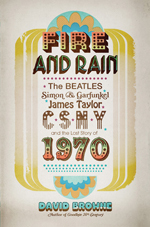Rolling Stone editor David Browne posits that albums can reflect our times much like a newspaper. He does a fine job proving his point in his intriguing new book.
Browne entered his teens after 1970 lurched out of the tumultuous 1960s, and he writes about the music he loved back then.
The albums he chose to support his argument: Simon & Garfunkel’s “Bridge Over Troubled Water,” Crosby, Stills, Nash & Young’s “Deja Vu,” the Beatles’ “Let It Be” and James Taylor’s “Sweet Baby James.”
Like a time capsule, these albums mirrored the social changes happening outside of the studios in which they were made, even as the musicians waged their own wars against one another. In 1970, “two of those groups fell apart, one achieved critical cultural mass and also collapsed, and another broke through to a new level of mass acceptance.”
Browne juxtaposes the growing disharmony within CSNY with the turbulent year of Charles Manson’s trial, homegrown terrorist bombings, Nixon’s polarizing presidency and buzzwords like recession and inflation.
“Something about ‘Deja vu’ — the sense of frailty in ‘4+20’ and ‘Helpless,’ the addled paranoia of ‘Almost Cut My Hair,’ the urge to escape it all in ‘Our House’ — summed up post-Kent State America. The dark clouds that hovered over the album, the results of the band’s own personal relationships and emotional tumult, also tapped into something larger and beyond their control.”
Some of the Beatles material Browne dutifully revives feels shopworn; plenty has already been written about the Beatles’ breakup.
While Browne earns kudos for tracking down the legal court papers Paul McCartney filed on Dec. 31, 1970, to dissolve the foursome, he’s more captivating when he reminds readers of how the unraveling of Simon & Garfunkel reflected the mood of 1970.
In a year of reflective, tuneful pop standards — “Let It Be,” “We’ve Only Just Begun,” “The Long and Winding Road,” “Your Song,” “Ain’t No Mountain High Enough,” “Big Yellow Taxi” and “Fire and Rain” — none loomed larger than the Grammy-winning Song and Record of the Year “Bridge Over Troubled Water.” While its parent album flew out of college bookstores and served as a balm on a weary nation looking for quiet, homespun music after the ugly Altamont music festival in 1969, its composer quietly taught a songwriting course at New York University.
So, too, did Taylor’s music offer a cushy mattress against the rougher aspect of the times. The second single from his “Sweet Baby James” album, “Fire and Rain,” would take almost the entire year to become a hit, but Taylor’s ascension would soon usher in the confessional, soft rock epoch of the decade’s first half.
Taylor’s initially shy, seemingly addled persona in 1970 (probably a result of the hefty amount of heroin he consumed) reflected the confusion of the transitional 1970, Browne writes: “I couldn’t resist revisiting a moment when sweetly sung music and ugly times coexisted, even fed off each other, in a world gone off course.”
Browne gives just enough detail on the events plaguing the country, like the Kent State shootings that led to Neil Young’s timely dispatch, “Ohio,” for CSNY, to make his book’s thesis work. He leaves more fleshed-out accounts of U.S. history on Vietnam strategy and the Manson trial to others.
Yet his vivid account of the March bombing of a New York brownstone on 18 West 11th St. by homegrown radicals stuns readers with the brutality that existed despite the amiable “you’ve got a friend”-styled tunes populating AM radio.
As actor Dustin Hoffman stood clutching belongings he salvaged from his adjacent apartment, “A large power shovel cleaning debris out of the basement scooped up a body with two missing hands, one leg, and a mangled head, nails jutting out of the torso’s flesh.”
“Fire and Rain” works as a history lesson, but is foremost a music fan’s fast-paced appreciation of the brilliance of that era’s artists.
Perhaps only Paul Simon, 70 this year, remains the most consistently creative; his new album “So Beautiful or So What” rivals his 1970 work. Maybe in a later book Browne can write about how Simon captures his generation’s concerns in 2011 as well as he did 41 years ago. But for now, “Fire and Rain’s” astute observations compel.
Send questions/comments to the editors.



Success. Please wait for the page to reload. If the page does not reload within 5 seconds, please refresh the page.
Enter your email and password to access comments.
Hi, to comment on stories you must . This profile is in addition to your subscription and website login.
Already have a commenting profile? .
Invalid username/password.
Please check your email to confirm and complete your registration.
Only subscribers are eligible to post comments. Please subscribe or login first for digital access. Here’s why.
Use the form below to reset your password. When you've submitted your account email, we will send an email with a reset code.